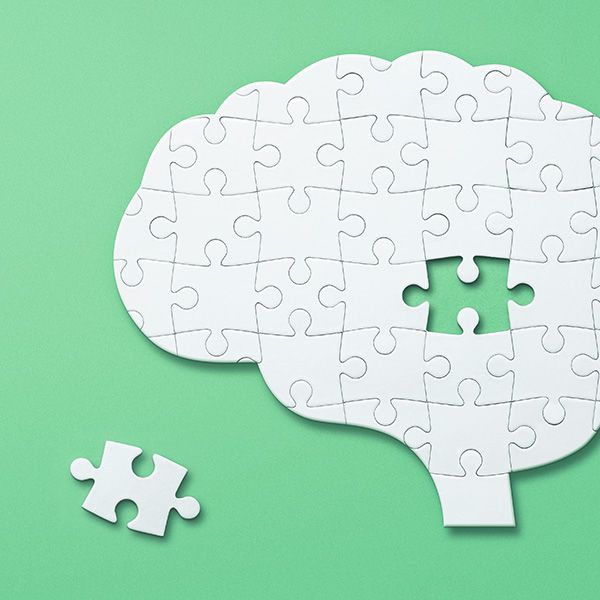
read time: 4 min
Health & Wellness
There’s reason to be hopeful for the 6.5 million people diagnosed annually with Alzheimer’s disease in the US and their families.1
For years, people have watched Alzheimer’s disease, the most common form of dementia, steal away their or their loved ones' memories without having any way to stop it.2 Thanks to advancements in Alzheimer’s testing and medication, there are options to diagnose and treat the disease sooner. That knowledge gives you the power to impact your future. With greater insights into your risks, you can make changes and monitor your health with the help of your doctor to have a better chance at slowing the progression of Alzheimer’s disease.
Searching for Alzheimer’s biomarkers
Before we try to slow the progression of Alzheimer’s, we need to understand more about the disease. Alzheimer’s disease is diagnosed when you have certain biomarkers (an element in your body that signals a disease or condition) in your brain: amyloid and tau proteins.3 Amyloid proteins grow into a plaque that builds up in the brain, while tau proteins get tangled inside the brain cells.4
Over time, amyloid plaque and tau tangles damage the brain. Damage starts in the part of the brain that manages learning and memory. That’s why people with Alzheimer’s develop dementia symptoms like memory loss, difficulty doing routine tasks and solving problems, struggles with speaking or writing, poor judgment, changes in mood, and more.5
As amyloid plaque builds up in your brain, your healthy neurons (left) slowly become damaged (center and right), leading to increased dementia symptoms.
A breakthrough in Alzheimer’s testing and diagnosis
Diagnosing Alzheimer’s disease has been a long and complicated process. Until the 1980s, we actually had no way of confirming a diagnosis in a living person. The only way to identify the disease was to examine someone’s brain for amyloid plaque and tau tangles after they died.6
Over time, our diagnostic tools became more sophisticated, letting us diagnose Alzheimer’s in a living person. Then, in 2022, a blood test was developed that can detect amyloid biomarkers much more conveniently than previous diagnostic tools like spinal taps or positron emission tomography (PET) scans could.7
This was a major breakthrough: blood tests like AD-Detect™ Test for Alzheimer's Disease Risk are not only less invasive, but significantly less expensive to perform. The medical community is working to make these blood tests more readily available and accessible throughout the healthcare system to help people understand their risk of Alzheimer’s earlier.
We’re not just getting better at diagnosing Alzheimer’s disease—scientists are developing ways to screen for Alzheimer’s before symptoms even start. Some genes—another type of biomarker—have been linked to a higher risk of developing Alzheimer’s.8 With knowledge from genetic testing, people in their 40s and 50s who have certain genes can start discussing their risk level and lifestyle change options before any symptoms are present.
Understanding your risk
Thinking about checking your risk with a genetic test, or considering diagnosis through detection of amyloid and tau biomarkers? Your doctor will likely want to assess you through several other screening options first, including:
Medical history
You’ll review lifestyle factors that impact Alzheimer’s, like physical inactivity, obesity, diabetes, depression, smoking, hearing loss, and binge drinking.1
Neurological exam
Your doctor will assess your speech, body coordination, reflexes, and more.
Functional and behavioral evaluations
Your doctor will check your memory, language skills, problem-solving skills, attention span, and mental health.
Physical exam and lab tests
Through exams and lab testing, your doctor will try to rule out other conditions that may cause dementia-like symptoms, like depression, thyroid issues, and sleep apnea.9
Mind-body connection
Yes, exercising your brain with crosswords and other puzzles is recommended to help keep Alzheimer’s and dementia symptoms at bay. But physical exercise is just as important.10
Moving closer to an Alzheimer’s cure
Right now, we don’t have a cure for Alzheimer’s disease. However, science is getting closer, and if you or a loved one is at risk for Alzheimer’s, there are more treatment options than ever before.
Helping to slow the progression of Alzheimer’s
In just the last few years, 2 medications have become available—aducanumab11 and lecanemab12—that can help delay dementia symptoms and slow progression of the disease by removing amyloid plaque. So while you may not be able to stop the clock completely on Alzheimer’s yet, you can potentially postpone some forms of cognitive decline.

Evolving treatment through clinical trials

Thanks to innovation in testing and treatment, an Alzheimer’s diagnosis can now come with hope. Knowing your risk is the first step in the journey to delaying the onset of Alzheimer’s disease. With knowledge and lifestyle changes, you can help make a difference in your long-term cognitive health.
References
1 Reducing risk of Alzheimer’s disease.
Centers for Disease Control and Prevention. Accessed June 28, 2023. https://www.cdc.gov/aging/publications/features/reducing-risk-of-alzheimers-disease/index.htm
2 Dementia vs. Alzheimer’s disease: what is the difference?
Alzheimer’s Association. Accessed June 28, 2023. https://www.alz.org/alzheimers-dementia/difference-between-dementia-and-alzheimer-s
3 What is Alzheimer’s disease?
Alzheimer’s Association. Accessed June 28, 2023. https://www.alz.org/alzheimers-dementia/what-is-alzheimers
4 What happens to the brain in Alzheimer’s disease?
National Institute on Aging. Accessed June 28, 2023. https://www.nia.nih.gov/health/what-happens-brain-alzheimers-disease
5 10 early signs and symptoms of Alzheimer’s.
Alzheimer’s Association. Accessed June 28, 2023. https://www.alz.org/alzheimers-dementia/10_signs
6 Milestones.
Alzheimer’s Association. Accessed June 28, 2023. https://www.alz.org/alzheimers-dementia/research_progress/milestones
7 Hu Y, Kirmess KM, Meyer MR, et al. Assessment of a plasma amyloid probability score to estimate amyloid positron emission tomography findings among adults with cognitive impairment. JAMA Netw Open. 2022;5(4):e228392. doi: 10.1001/jamanetworkopen.2022.8392
8 Is Alzheimer’s genetic?
Alzheimer’s Association. Accessed June 28, 2023. https://www.alz.org/alzheimers-dementia/what-is-alzheimers/causes-and-risk-factors/genetics
9 Medical testing for diagnosing Alzheimer’s.
Alzheimer’s Association. Accessed June 28, 2023. https://www.alz.org/alzheimers-dementia/diagnosis/medical_tests
10 Tian YE, Di Biase MA, Mosley PE, et al. Evaluation of brain-body health in individuals with common neuropsychiatric disorders. JAMA Psychiatry. 2023;80(6):567–576. doi:10.1001/jamapsychiatry.2023.0791
11 Woloshin S, Kesselheim AS. What to know about the Alzheimer drug aducanumab (Aduhelm). JAMA Intern Med. 2022;182(8):892. doi:10.1001/jamainternmed.2022.1039
12 van Dyck CH, Swanson CJ, Aisen P, et al. Lecanemab in early Alzheimer’s disease. N Engl J Med. 2023;388:9-21. doi:10.1056/NEJMoa2212948









